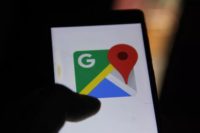Permissions on Android apps are intended to be gatekeepers for how much data your device gives up. If you don’t want a flashlight app to be able to read through your call logs, you should be able to deny that access. But even when you say no, many apps find a way around: Researchers discovered more than 1,000 apps that skirted restrictions, allowing them to gather precise geolocation data and phone identifiers behind your back. Read full story here: More Than 1,000 Android Apps Harvest Data Even After You Deny…
Read MoreTag: Privacy
The Pentagon Can Now Identify People By Measuring Their HeartBeats | Digital Trends
As if facial recognition and digital fingerprinting weren’t scary enough, the Pentagon has reportedly developed a method for remotely identifying and tracking people through their heartbeat. Heartbeats are as unique and distinctive as fingerprints, but are distinct in that they can be read from a distance. And it’s this that the Pentagon is taking advantage of, according to a report in the MIT Technology Review. Developed to identify combatants in war zones, the idea is to listen in to those unique cardiac signatures using an infrared laser. Unlike other identification methods like…
Read MoreAmazon’s Helping Police Build A Surveillance Network With Ring Doorbells | CNET
If you’re walking in Bloomfield, New Jersey, there’s a good chance you’re being recorded. But it’s not a corporate office or warehouse security camera capturing the footage — it’s likely a Ring doorbell made by Amazon. While residential neighborhoods aren’t usually lined with security cameras, the smart doorbell’s popularity has essentially created private surveillance networks powered by Amazon and promoted by police departments. Read full story here: Amazon’s Helping Police Build A Surveillance Network With Ring Doorbells | CNET
Read MoreUS Now Requires Social Media Info For Visa Applications | Engadget
If you want to stay in the US, you’ll likely have to share your internet presence. As proposed in March 2018 (and to some extent in 2015), the country now requires virtually all visa applicants to provide their social media account names for the past five years. The mandate only covers a list of selected services, although potential visitors and residents can volunteer info if they belong to social sites that aren’t mentioned in the form. Read full story here: US Now Requires Social Media Info For Visa Applications |…
Read MoreDHS Gave Border Agents Free Rein Over Thousands Of Warrantless Device Searches | CNET
Border agents conducted more than 33,000 device searches in 2018. Court records show they were allowed to share what they found with other government agencies. Police are required to get a warrant to search through your devices, but the Department of Homeland Security’s border patrol agents haven’t been following those rules, documents show. The American Civil Liberties Union and the Electronic Frontier Foundation filed evidence in court on Tuesday detailing testimony and documents on how the DHS has allowed its agents to search through people’s phones and laptops without a…
Read MoreFacebook Data Leak: Province-By-Province Breakdown Of Affected Canadians | CTV News
The report was the result of a joint investigation launched a year ago by the Privacy Commissioner of Canada and the Information and Privacy Commissioner for British Columbia. The probe was prompted by concerns that Facebook had broken Canadian privacy laws after it was revealed that the social media giant disclosed users’ personal information to a third-party app called “This is Your Digital Life” (TYDL) that was later used to deliver targeted political messaging by Cambridge Analytica. Read full story here: Facebook Data Leak: Province-By-Province Breakdown Of Affected Canadians |…
Read More‘Is That Even Legal?’: Companies May Be Sharing New Credit Or Debit Card Information Without You Knowing | CBC News
A Vancouver woman is sounding the alarm for millions of Canadians who have credit and debit cards, after information about her debit card was shared when it shouldn’t have been. Vanessa Acuña blames an “updating service” that some credit and debit card companies have that allows new account numbers and expiry dates to be shared with merchants customers have dealt with in the past. Read full story here: ‘Is That Even Legal?’: Companies May Be Sharing New Credit Or Debit Card Information Without You Knowing | CBC News
Read MoreLaw Enforcement Taps Google’s Sensorvault For Location Data, Report Says | CNET
Police have used information from the search giant’s Sensorvault database to aid in criminal cases across the country, according to a report Saturday by the New York Times. The database has detailed location records from hundreds of millions of phones around the world, the report said. It’s meant to collect information on the users of Google’s products so the company can better target them with ads, and see how effective those ads are. Read full story here: Law Enforcement Taps Google’s Sensorvault For Location Data, Report Says | CNET
Read MoreMicrosoft: Hackers Compromised Support Agent’s Credentials To Access Customer Email Accounts | TechCrunch
On the heels of a trove of 773 million emails, and tens of millions of passwords, from a variety of domains getting leaked in January, Microsoft has faced another breach affecting its web-based email services. Microsoft has confirmed to TechCrunch that a certain “limited” number of people who use web email services managed by Microsoft — which cover services like @msn.com and @hotmail.com — had their accounts compromised. Read full story here: Microsoft: Hackers Compromised Support Agent’s Credentials To Access Customer Email Accounts | TechCrunch
Read MoreThousands Of Amazon Workers Are Listening To What You Tell Alexa | BNN Bloomberg
Tens of millions of people use smart speakers and their voice software to play games, find music or trawl for trivia. Millions more are reluctant to invite the devices and their powerful microphones into their homes out of concern that someone might be listening. Read full story here: Thousands Of Amazon Workers Are Listening To What You Tell Alexa | BNN Bloomberg
Read More









